Start as a HHA in 4 Weeks!
Start as a HHA in 4 Weeks!
You can start your new home health aide (HHA) career in about four (4) weeks.
Because there are very few requirements to become a HHA, many people find it to be a great way to enter the healthcare industry.
And for good reason – it is one of the fastest growing jobs and there are thousands of job openings.
With just a little bit of planning you can be working and earning money for you and your family.
Here’s a breakdown of each components necessary and how many weeks each one takes.
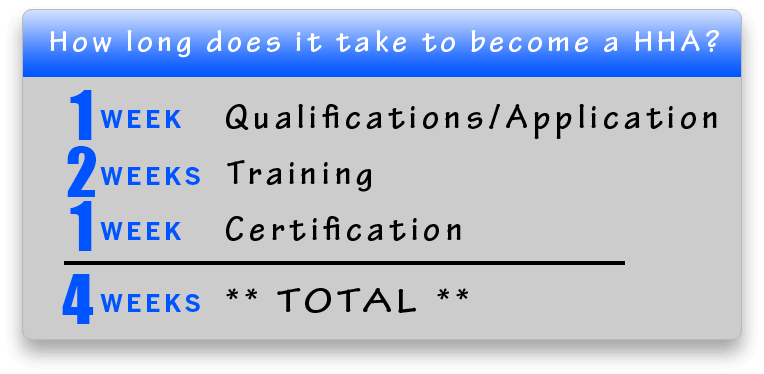
 Qualifications And Application To Be A HHA
Qualifications And Application To Be A HHA
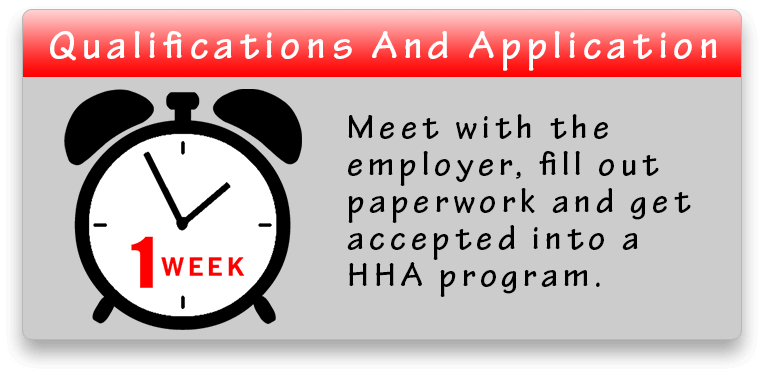
It may take up to one (1) week from meeting with the potential employer, filling out paperwork and accepted into a program.
The requirements are quite simple and once certified you can take your basic nursing and home care skills with you anywhere you go.
If you advance in the medical field you can rely on the “basics”; if you care for a family in the future you will apply these home care skills each day.
HHA Qualifications
- Work Eligibility
- Must be a U.S. citizen or eligible to work in the U.S.
- Type of Certification
- Certification required if employed by agency accepting Medicare payments
- Application Form
- Application required; along with other information (e.g., proof of education, references, etc.)
- Age
- Usually no age requirements; states may require to be over 18 years old
- Driver’s License
- Driver’s license usually required
- Education Level
- Most employers will require a high school diploma / GED
- Training
- Adheres to Federal requirements as well as state laws
- Exam
- Most states require passing a competency test
- Experience
- None required
- Health Immunizations
- Fingerprints
- Fingerprinting may be required
- Background checks
- Other Requirements
- Photo ID

 The Training
The Training
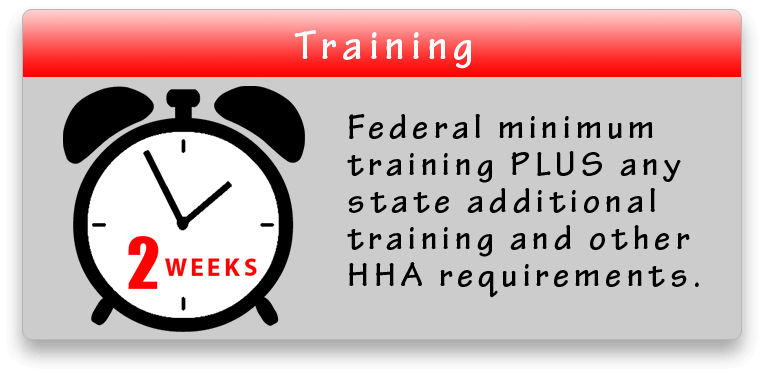
Home health aide training programs will take about two (2) weeks.
Your training will be the single largest driver of how long it will take to be a certified.
Federal HHA Training Requirements
Federal law requires Medicare-certified home health agencies that use home health aides must be trained /evaluated (i.e., tested) by programs approved by their respective state.
Home aides who work for organizations that receive funds from Medicare or Medicaid must complete formal training.
Those who work for private companies do not have to meet these obligations.
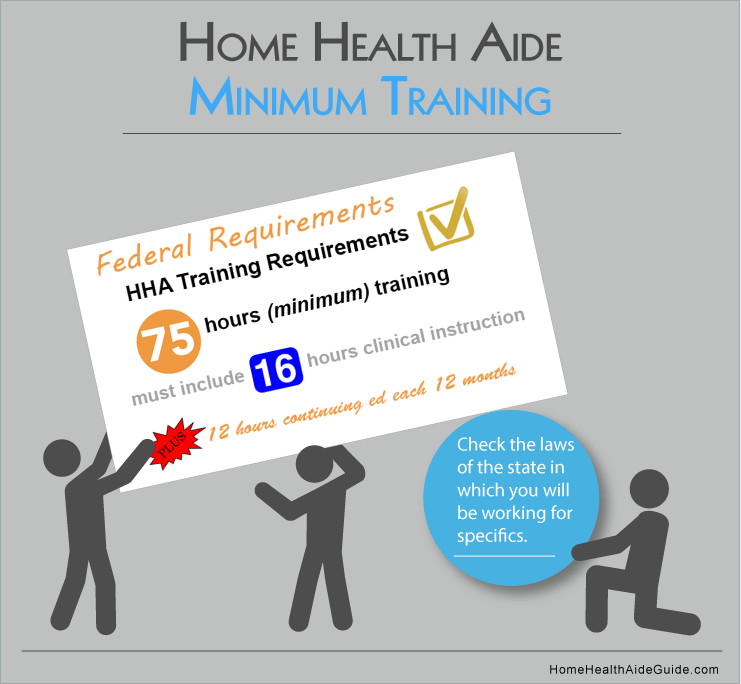
Every state must adhere to at least this training:
At least 75 hours of training, including at least 16 hours of supervised practical or clinical training and 12 hours of continuing education per 12-month period.
About every home health agency accepts Medicare patients and you will not be allowed to work without being certified.

State Training Requirements
Each state must adhere to the Federal law for training (above) and many states require additional training.
Know the specifics of your state before you begin planning.
Some states mandate that you must also be a certified nursing assistant (CNA); this is more complicated and takes more time and training; and other states (e.g. Washington D.C.) need trainees to take a pre-admission examination to assess reading, writing, and math skills before enrolling in a program.
The most common state rule?
Increasing the 75 hours to 120 hours and even 160 hours.
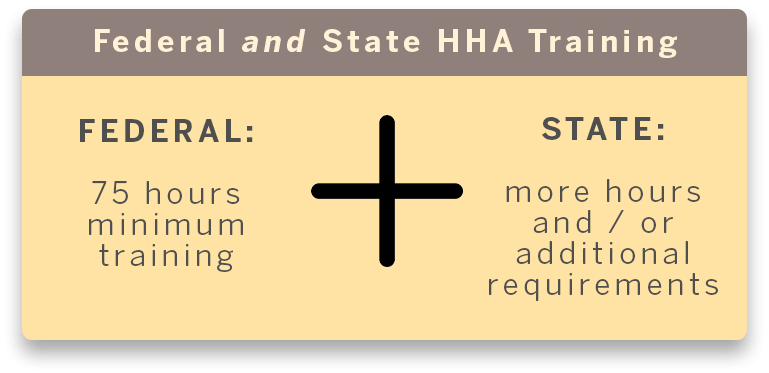
Full Time or Part Time Training
If you are very serious and are looking to work as soon as possible then you need to consider full-time training.
Looking to be working in a month or so then full-time training is for you.
Advantages of full-time training:
Commitment: You will be more committed and take it more seriously if you are doing it full-time. You will need to stay focus and maximize your time between training and clinic work you are more committed – you’ll have no choice!
Knowledge: Full-time trainees have more knowledge and familiarity with the material – they’ll train more in a shorter period. If you train at a home health agency you will become more familiar with the company and staff giving you advantage when it comes to hiring people.
Expenses: If you finance your training (i.e., pay on a monthly basis for certification cost) it may cost more: may be interest charges spread over a longer period of time. Look for other extra charges even if you take advantage of home health aide training for free.
If you need to work as soon as you can and make money then full-time training is a no-brainer.

 Certification Upon Passing The Competency Exam
Certification Upon Passing The Competency Exam
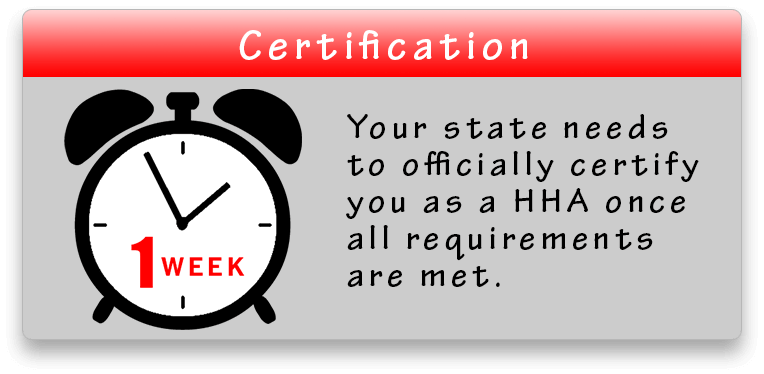
Each state has their own rules… the average is about one (1) week from the time you successfully pass the test in order to get your HHA certification.
Successful completion of a HHA program and passing the home health aide certification test are two huge accomplishments and bring you VERY close to getting certified.

The very last step is the formal designation of “certified home health aide”.
Some states certify you immediately after you pass the exam. Other states have you submit the paperwork (whether hard copies or electronic file) then notify you if you’re cleared to work in homes helping people.

Summary
Now that you’re a certified home health aide what’s next?
You may want to think about advancing in the field and making more money!
Simple ways to make more money:
- take any and all client assignments you can get
- train other aspiring home health aides
- go from temp to permanent
- private assignments not within your agency
- become a supervisor of others and watch your salary increase
Your chances of earning more money or getting a promotion with your employer will be limited if you do not further your education and skill set.
The basics of home care are, well, basic but there is always something else to learn in the field of home care and you should take advantage of any and all training – many times your employer will even pay for it!
Think long term, too. With your high school diploma you may consider being a certified nursing assistant (CNA).
How is a home health aide is different from a certified nursing assistant (CNA)?
Similar Jobs to a Home Health Aide
The terminology can be confusing – depends on who is using it and where.
Here’s a breakdown on some of the differences between all of them.
Personal Care Aide (PCA)
- PCA’s help clients with their daily living activities while other health care professionals attend to their basic health needs
Certified Nursing Assistants (CNA)
- CNA’s assist with clients’ health and hygiene needs
- similar to home health aides, but CNA’s usually work in hospitals, nursing homes and health clinics, rather than in the home. Must be (CNA) certified
Direct Support Professional (DSP)
- DSP’s work with people with disabilities – mostly developmental disabilities
- clients usually require more intensive and specialized care beyond what HHA’s provide
- work for agencies operating group homes
- no certification required
For those who do move on in their medical career the most common paths lead to medical assistant, registered nurse, or even an ultrasound technologist.
FREE
Easy Steps
How To
Be a HHA
Download, for FREE of course, this all new guide on how to become a home health aide. Tips and resources you can view or print for later use – all yours.


 Qualifications And Application To Be A HHA
Qualifications And Application To Be A HHA The Training
The Training Certification Upon Passing The Competency Exam
Certification Upon Passing The Competency Exam